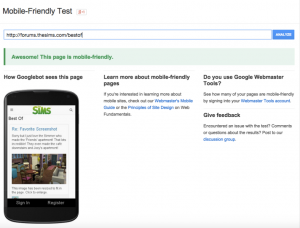Search marketing has long had an emphasis on keywords, but columnist Benjamin Spiegel believes the future will be more about conversations.

Google is changing the way it thinks about keywords. Search is no longer about the phrase you type into a box; it’s about creating a natural conversation with the user. Google is doing that by modifying the search query based on the entire “conversation,” and most importantly, it is doing that across all your devices.
This will change the way we engage with search forever, because once search is about conversations vs. questions, you can no longer buy keywords; instead, you have to “buy” your part in the conversation.
Do you remember the computer that communicated with the crew in Star Trek? It was science fiction at its best, providing a seamless experience that allowed natural, organic communication between an information source and a human user.
Scotty asked for the ship’s ETA to an M-class planet and the computer responded in plain English; Capt. Picard needed background info on the Klingon chieftain and, in an instant, it was provided as if someone were reading from an encyclopedia.
Fast forward to today. When Siri and similar services first emerged, I was reminded of those seamless human-to-computer interactions that were fun, conversational and hyper-relevant. It seems that in terms of search, we are heading toward a voyage on the Starship Enterprise.
The Demise Of Keywords?
So what does this have to do with the death of my beloved keywords? Why is natural vocal interaction with computers making me think about their demise?
Here is why: I recently attended a meeting between some of our search leads and Google, and a highlight of that event was the presentation by one of the Google engineers (those mythical creatures that were molded from clay and spend their days experimenting on secret projects).
To my surprise, he told us that most of his fellow engineers that work on Google’s search product actually do not like the search box; they believe that it offers a sub-par user experience, and they are constantly trying to create a more natural interaction between Google and its users.
And guess what? When this engineer spoke of his dream and how Google “should” work, he brought up the Star Trek computer, which he says is the ultimate goal for him and some of his colleagues.
He proceeded to showcase some of the company’s cool innovation projects around wearables, Glass and Android. Halfway through his demo, we started to talk about search, and he showed us two current live product features that I believe will dramatically change the way search marketers think about and buy search. (FYI, these are not beta features; you can try them yourself using the Google app on any device.)
Note: The developer also mentioned another visionary goal with users in minds: Google hopes to reduce the time people spend on its search results pages by constantly improving the accuracy and quality of its results. He stated that contrary to popular belief, they want people to have a life and experience it, and spend less time – not more – on Google.
The Search Conversation
Google has always shown you results that are partially influenced by your search and browsing history.
But, in an attempt to create a more natural search experience (one that feels like the Star Trek crew’s experiences), the Google engineers have been working on a way to implement search results that are based on your current “search conversation” – in the moment, and across devices, using voice search.
Here are some examples that highlight this perfectly.
Voice Search for “Shoes” |
Search Results for the Query “Shoes” |
I used the Google voice search app to perform a simple search for the query [shoes]. As expected, Google returned the mobile results set for that query. Nothing revolutionary with that (aside from the fact that Google handles my German accent better than most other solutions).
Now, I want to perform another search, this time for Walmart.
Voice Search for “Walmart” |
Search Results for the Query “Walmart Shoes” |
As you can see, Google assumed that I am in the same search “conversation” and is treating both searches (for shoes and for Walmart) as part of a larger conversation; therefore, it went ahead and automatically changed my search query to [Walmart shoes] even though I only searched for Walmart.
While the quality and relevance of the query generated are questionable, I believe this to be a major step forward in improving the search experience.
There are many examples where Google does this using its Knowledge Graph backend. You can ask for information about [Rome, Italy], and then in the next search say things like [How many people live there?]. Google will automatically use your previous queries to guess what city you are referring to and then rewrite the search to: [How many people live in Rome, Italy?]
What is really intriguing from a wearables and marketers’ perspective is the cross-device functionality that happens when you are logged into the same Google account. As an example, you can use your desktop to search for [Museum of Science]:

Nothing new there until you then pick up your phone or smartwatch and search for [directions]; Google will automatically alter the query and give you directions to the Museum of Science, even if you never used that device to search for it before. How cool is that?
Voice Search for “Directions” |
Search Results for the Query “Directions to Museum of Science” |
For marketers, this is a huge step forward. We always knew that Google gives you results based on search history and location, but this proactive and automated search refinement could dramatically change the game.
Changing The Game For Organic & Paid Search
If this type of search experience and query modification goes mainstream, then it can become a truly massive disruption. From an SEO perspective, either rankings will become truly irrelevant or we will have to look at rankings as part of a larger chain.
For example, if someone searches first for Walmart and then for shoes, the SERPs will actually show results for the query [Walmart shoes] vs. just [shoes]. At that point, the ranking or even the current keyword may be totally irrelevant, as it will differ from user to user.
There will be similar implications on the paid search side. Generally, we would not advise brands to bid on a term like shoes, as it is just too broad and could refer to many different consumer intents. But this might change if Google continues to roll out “conversational search,” as the intent is clearly based on the previous queries.
I believe that soon we might be bidding on an activity instead of a key phrase. This could be categorical like [People looking for leather shoes] rather than the keyword-based [+Shoes +Leather +Buy].
This is a scary thought for many search marketers because it would mean relinquishing even more power to Google and losing control over exactly what keywords they buy. But given the amazing experiences and more fluent search experiences, it might be a tradeoff worth considering.
This conversational targeting (that is not tied to specific keywords) also is opening up a new frontier for search marketers. We have to start thinking about things like:
- Do I have a “conversational” search strategy?
- What is my voice search strategy?
- What is my wearable/device strategy?
- What are the conversations I want to own or participate in?
With the rise in connected homes and devices, we can no longer afford not to think about these questions.
Marketing Land – Internet Marketing News, Strategies & Tips
(417)
Report Post





